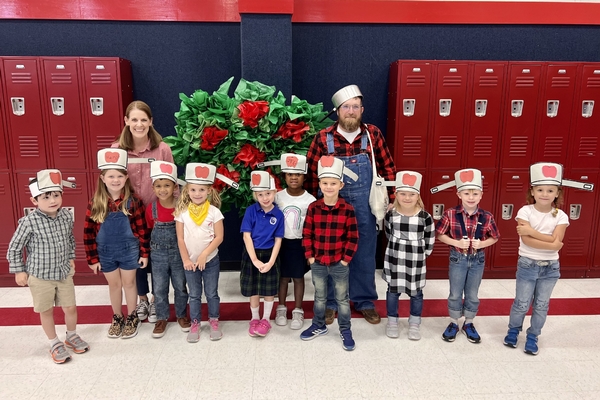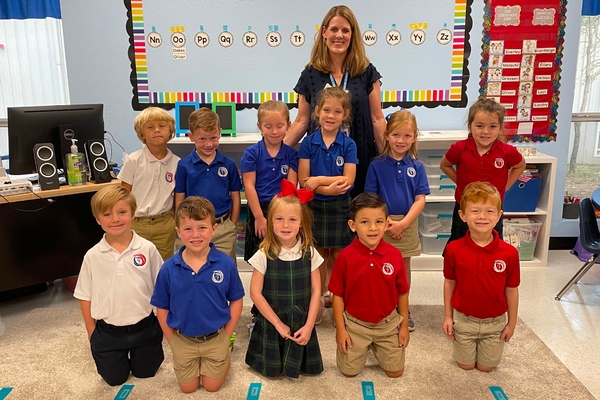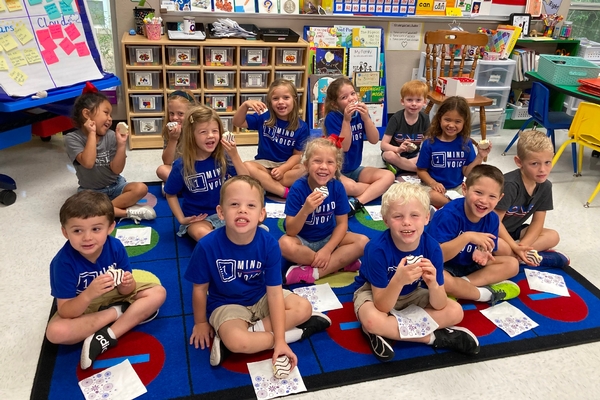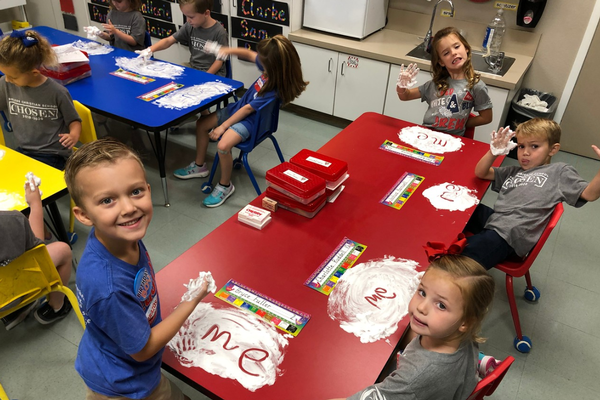Kindergarten Course of Study
Language Arts
Using the Johnny Can Spell curriculum, students will learn the sounds of the 26 letters of the alphabet individually and in combination. These form 70 common written symbols. This combination of sound and symbol is called a phonogram. These 70 phonograms represent 42 speech sounds. Using these phonograms, children are able to read and write words. Learning the sounds and symbol combinations and the rules that govern their use will help the student master the first steps of reading and spelling.
The scope and sequence is divided into multiple areas: Phonemic awareness, alphabet knowledge, penmanship, print and phonological knowledge, orthographic knowledge, derivation, vocabulary, sentences, sentence elements, sentence composition, and capitalization.
Reading and Writing
Literature, both fiction and nonfiction, is carefully selected to enhance unit studies. Through shared reading, echo reading, poetry and rhymes, students will learn concepts of print, decoding skills, comprehension strategies, and reading fluency, as well as literary elements such as characters, plot, setting, and themes. Students will participate in leveled reading groups. Journals, “Morning Message” and multiple activities are used to encourage writing skills.
Mathematics
The rigorous and balanced enVision Mathematics focuses on deep conceptual math understanding aided by visual models and combines problem-based learning and visual learning to deepen students’ conceptual understanding.The curriculum emphasizes conceptual understanding while building a mastery of basic skills. It explores a broad mathematics spectrum based on how children learn while preparing them for future mathematical needs. The program highlights include problem solving, developing readiness through hands-on activities, cooperative learning through partner and small group activities, practice through games and ongoing review.
Science
Science is skillfully combined with Math and Unit Studies using a hands-on approach and supported with non-fiction literature.
Unit Studies
Unit Studies include the following: Back to School, All about Me, Objects in the Sky, Day vs. Night, Diurnal/Nocturnal Animals, Nutrition, Apples/Johnny Appleseed, Fall, Pumpkins, Christopher Columbus, Map Skills, African Savanna, Squanto/Native Americans, Pilgrims/Thanksgiving, Gingerbread Man, Christmas, The Mitten, Polar Bears, Penguins, 100th Day of School, Weather, Friendship/Valentine’s Day, Presidents and American Symbols, Texas/Rodeo, Three Little Pigs, Matter, Dinosaurs, Easter, Plants, Insects, Oceans, and Summer.
Bible
In this study, kindergartners will learn about God through the lives of major characters throughout the Bible. Stories and lessons highlight biblical doctrines, scriptural principles, and character traits. Activities help students comprehend and apply Biblical truths.
Field Trips
Field trips in Kindergarten include: HEB or Costco, Cameron Park Zoo in Waco, retirement homes, The Gardens at Texas A&M, and the Brazos Valley Museum of Natural History.
Art
The goal of Visual Arts in the Kindergarten art curriculum is to develop creativity, fine motor coordination, observation skills, and resourcefulness. The introduction to God’s elements of design are presented. These are explored through cross-curriculum themes (including Line, Shape, Color, Value, Form, Texture, and Space) and styles associated with influential artists.
Computer
During weekly 30-minute sessions, students will begin learning the meaning of digital citizenship and sharpen computer navigation skills. They will also begin to learn basic keyboarding skills while practicing letter and sound recognition using Typing Club Jungle Junior. Using Sphero Indi, Code and Go Mouse and Beebot, kindergarteners will be introduced to coding and robotics. All students will learn Digital Citizenship throughout the year and practice applying Christian principles and a Biblical worldview in the digital world.
Music
Students explore the musical world by singing, playing instruments, creating, and listening. Movement and play are key elements of the child-centered curriculum informed by the philosophies and practices of Orff, Kodály, and Dalcroze. Students will sing in several programs throughout the year which include the Christmas play, Grandparents Day, and In His Steps, and weekly in chapel.
Library
Students will be introduced to a many authors and illustrators along with a variety of literary genres. They will explore both fiction and nonfiction books. Students attend library one time each week for 30 minutes.
P.E.
Students will explore motor skills and movement patterns using an integrated curriculum. They will learn responsible personal and social behavior in a variety of physical activity settings. They will be provided frequent and diverse opportunities to engage in physical activities necessary to support a healthy mind and body. Students attend P.E. four times a week for 30 minutes each class. At least one day per week will be dedicated to our "Eagle Running Program," a self-paced activity specifically focused on improving cardiovascular fitness.
Chapel
Grammar School students enjoy Chapel once a week in one of two sessions: PreK through second grade in one, and third through sixth grade in the other. In order to study and apply meaning, the yearly school-wide Scripture is divided into sections for each month and discussed in chapel. Grammar School worships in song, Scripture, and prayer, followed by a special speaker who teaches the specific passage in a developmentally appropriate way. Our speakers include local pastors, childrens’ ministers, youth leaders, Christian camp directors, parents, and BCS teachers, staff, and administrators. All would agree that Chapel is the favorite time of the week!
Recess
Students have the opportunity to learn socialization skills through play and free activities outdoors. Students enjoy a 30-minute recess after lunch. In addition, the students end the day with approximately 15 minutes for outdoor recess time.






